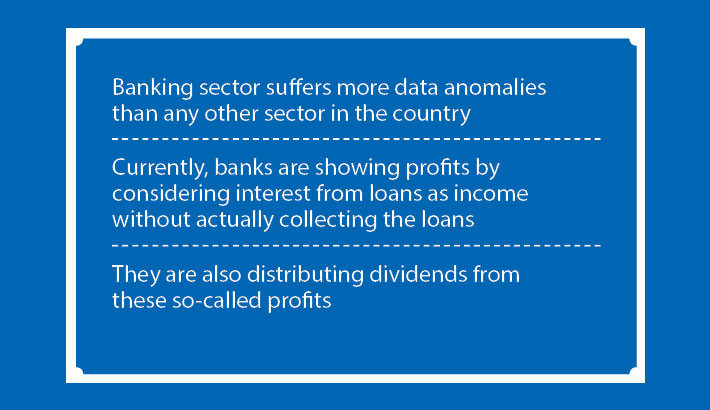
Dr Ahsan H Mansur, executive director of the Policy Research Institute (PRI) of Bangladesh, sharply criticised Bangladesh’s financial sector authorities for lack of transparency and anomalies with regard to publishing data and doubted the percentage of non-performing loans (NPLs) shared by the banks.
“On paper, the NPLs are about 10%, but actually this should be around 25%,” he said, claiming that the banking sector suffers more data anomalies than any other sector in the country.
He blamed poor governance, lack of transparency and lack of supervision in the sector as the country faced currency crisis and uncontrollable inflation.
“The financial sector (in Bangladesh) has become the worst sector in the past 10 years. The country is now facing both the US dollar and taka crisis due to poor governance,” he said.
He made the remarks as the chief guest at a discussion titled “Reasons for the Deterioration in Bangladesh’s Banking Sector,” organised by the Economic Reporters Forum (ERF) in Dhaka on Saturday.
ERF President Refayet Ullah Mirdha chaired the event moderated by ERF General Secretary Abul Kashem.
Dr Mansur pointed out that it’s not only export data that is being concealed, rather the financial sector hides more data than any other sector although presenting “accurate data is the most crucial here.”
The economist observed, “Currently, banks are showing profits by considering interest from loans as income without actually collecting the loans.”
“They (the banks) are also distributing dividends from these so-called profits. The government is getting taxes from this. In reality, the banks are not making any income; they are essentially consuming the depositors’ money. This situation is akin to ‘selling household utensils to eat gourmet food’,” he stated.
“How long can the bankers continue like this? Deposits will eventually be exhausted, and they won’t be able to return the customers’ money.”
Dr Mansur said, “Due to lack of supervision, our currency market is now out of control, and inflation is beyond our grasp.”
He emphasised that the government and Bangladesh Bank must take initiatives to “clean” the financial sector.
He said, “The problems in the banking sector are being kept unresolved. It’s like sweeping the dirt under the carpet, which doesn't eliminate the stench; it will resurface someday.”
The economist remarked that attempts are being made to hide irregularities in various ways, “but such concealment has spread the stench of irregularities throughout the economy.”
“Problems like bad loans, irregularities, corruption, and money laundering cannot be solved by hiding the issues,” he pointed out.
PRI executive director lamented that the banking sector has been eaten away by corruption, increasing irregularities and creating a crisis of confidence.
“The situation is now such that the banks can’t even protect themselves. How can they ensure the security of the depositors’ money?”
The economist expressed concerns about the growth of bank deposits as the government, in the FY 2025 budget, targets to borrow Tk1.37 lakh crore from the banking sector.
“Currently, the growth of bank deposits is between 8.5-9%. If it increases this year, it might reach a maximum of 10%. This means deposits will amount to around Tk1.70 lakh crore.”
“With the new fiscal year’s budget target of borrowing from banks, how will the banks provide the loans? If the government borrows Tk1.37 lakh crore, where will the private sector get its money?”
Dr Ahsan H Mansur said, “Before the elections, it was promised that there would be extensive reforms in the financial sector. But six months have passed, and nothing has been done. This is very disappointing. Reforms in the banking sector are urgently needed in the national interest.”
Daily Samakal special correspondent Obaidullah Rony and daily Prothom Alo senior reporter Sanaullah Sakib presented a keynote paper at the event.
The paper mentioned that while the government earned praise for constructing infrastructures like the Padma Bridge, this achievement is now overshadowed by high inflation, non-performing loans, and financial scandals.
As the regulatory authority of the financial sector, the responsibility falls on Bangladesh Bank, it said.
In the paper, the journalists expressed concerns that if immediate action was not taken on these issues, it could create major problems for the country’s banking sector.
The paper highlighted that due to the financial distress, Bangladesh is becoming increasingly dependent on loans, and its ability to obtain loans is gradually decreasing.
“Moreover, the government is not able to collect sufficient revenue to implement the budget. There is now a shortage of necessary funds and dollars for budget implementation” it added.
The paper also noted that the government is unable to pay bills in sectors like energy due to a lack of sufficient dollars.
“If the health of the banking sector is poor, it cannot bear any burden. The weakness in the banking sector is preventing it from lending to both the private sector and the government,” it observed.

